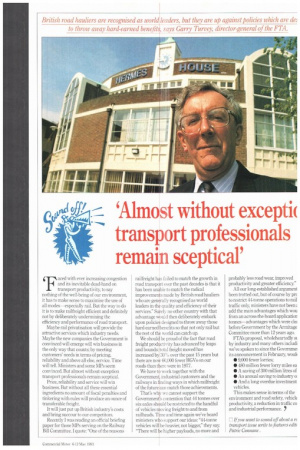acVP 'Almost without excepth
Page 55

If you've noticed an error in this article please click here to report it so we can fix it.
transport professionals remain sceptical'
, aced with ever increasing congestion
and its inevitable dead-hand on transport productivity, to say nothing of the well-being of our environment, it has to make sense to maximise the use of all modes—especially rail. But the way to do it is to make railfreight efficient and definitely not by deliberately undermining the efficiency and performance of road transport.
Maybe rail privatisation will provide the attractive services which industry needs. Maybe the new companies the Government is convinced will emerge will win business in the only way that counts; by meeting customers' needs in terms of pricing, reliability and above all else, service, Time will tell. Ministers and some MPs seem convinced. But almost without exception transport professionals remain sceptical.
Price, reliability and service will win business. But without all these essential ingredients no amount of fiscal penalties and tinkering with rules will produce an ounce of transferable freight.
It will just put up British industry's costs and bring succour to our competitors,
Recently I was reading an official briefing paper for those MPs serving on the Railway Bill Committee.! quote: "One of the reasons
railfreight has failed to match the growth in mad transport over the past decades is that it has been unable to match the radical improvements made by British road hauliers who are generally recognised as world leaders in the quality and efficiency of their services." Surely no other country with that advantage would then deliberately embark upon policies designed to throw away those hard-earned benefits so that not only rail but the rest of the world can catch up.
We should be proud of the fact that road freight productivity has advanced by leaps and bounds: total freight moved has increased by 30% over the past 15 years but there are now 60,000 fewer FIGVs on our roads than there were in 1977.
We have to work together with the Government industrial customers and the railways in finding ways in which railfreight of the future can match those achievements
That's why we cannot support the Government's contention that 44 tonnes over six-axles should be restricted to the handful of vehicles moving freight to and from railheads. Time and time again we've heard ministers who support our ideas: "44-tonne vehicles will he heavier, not bigger," they say. "There will be higher payloads, no more and
probably less road wear, improved productivity and greater efficiency" All our long-established argument been trotted out, but of course by prc to restrict 44-tonne operations to rail traffic only ministers have not been add the main advantages which wou from an across-the-board application tonnes—advantages which were cle before Government by the Armitage Committee more than 12 years ago.
FTA's proposal, wholeheartedly si by industry and many others includi we've spoken to since the Governmei its announcement in February wouls 09,000 fewer lorries; • 180 million fewer lorry miles ea • A saving of 300 million litres of • An annual saving to industry o: • And a long overdue investment vehicles.
This makes sense in terms of the environment and road safety vehicle productivity a reduction in traffic co and industrial performance. / fl If you want to sound off about a rc transport issue write to features edite Patric Cunnane
























































































